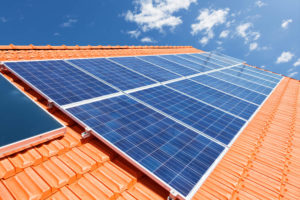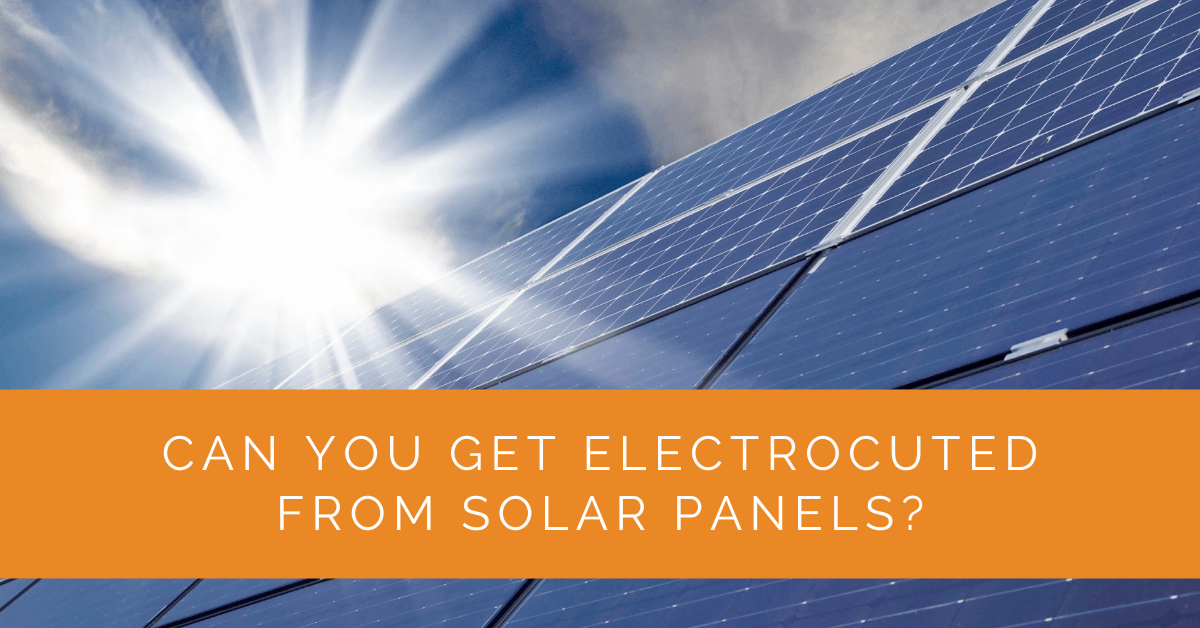Solar panels have become a popular choice for clean and sustainable energy generation. However, concerns about the risk of electric shock or electrocution associated with solar panels have surfaced. This article will delve into the safety measures and facts surrounding solar panel electrical risks. Understanding the safety precautions and proper installation practices is crucial for ensuring a safe and efficient solar panel system.
Contents
- 1 Key Takeaways
- 2 Understanding Solar Panel Systems
- 3 Electrical Safety Measures in Solar Panels
- 4 Safe Installation and Maintenance Practices
- 5 Mitigating Risks and Safety Precautions
- 6 Case Study: Ensuring Electrical Safety in Solar Panel Installations
- 7 Expert Insights From Our Solar Panel Installers About Electrical Safety and Solar Panels
- 8 Experience Solar Excellence with Us!
- 9 Conclusion
Key Takeaways
- Solar panels are designed with various safety measures, including bypass diodes, grounding, and proper wiring, to minimize the risk of electric shock or electrocution.
- Hiring qualified installers, following safe work practices, and conducting regular inspections and maintenance are crucial for ensuring the safe operation of solar panel systems.
- Educating homeowners and users about safety precautions, such as proper cleaning procedures and emergency shutdown protocols, helps mitigate potential electrical risks and promotes a safe environment for solar energy utilization.
Understanding Solar Panel Systems
Solar Panel Basics
Solar panels harness the power of sunlight to generate electricity through the photovoltaic (PV) effect. Comprising interconnected solar cells, they produce direct (DC) electricity converted into alternating (AC) using an inverter. It is essential to grasp the fundamental working principles of solar panels to understand the associated electrical risks better.
Photovoltaic (PV) Systems
PV systems encompass the complete setup of solar panels, wiring, inverters, and other components. The electrical configuration of PV systems varies based on their applications, such as grid-tied, off-grid, or hybrid systems. Each system requires proper design, installation, and maintenance to ensure electrical safety.
Electrical Safety Measures in Solar Panels
Module-Level Safety
Solar panels incorporate several safety features at the module level to mitigate electrical hazards. One such feature is bypass diodes that prevent power losses in case of shading or module malfunctions. Proper grounding of solar panels ensures the safe dissipation of excess electrical energy and reduces the risk of electrical shock.
Wiring and Circuit Protection
Proper wiring and circuit protection are critical in solar panel installations. Overcurrent protection devices, such as fuses or circuit breakers, safeguard against excessive current flow. Ground-fault protection devices detect and mitigate ground faults, reducing the risk of electric shock. Additionally, disconnect switches enable the isolation of the solar panel system during maintenance or emergencies.
Compliance with Electrical Codes and Standards
Adhering to local electrical codes and standards is essential for the safe installation of solar panels. These codes address various aspects, including grounding, wiring methods, and system interconnections. Compliance ensures the solar panel system meets safety requirements and mitigates potential electrical risks.

Safe Installation and Maintenance Practices
Qualified Installers and Professionals
Hiring qualified and certified solar panel installers cannot be overstated. Proper installation by trained professionals ensures adherence to safety standards, proper wiring connections, and compliance with local regulations. Qualified installers possess the necessary expertise to mitigate electrical risks associated with solar panels.
Safe Work Practices
Safe work practices are vital during solar panel installation and maintenance. Workers must follow safety protocols, including using personal protective equipment (PPE) like gloves, goggles, and appropriate footwear. Training on safe work practices, such as avoiding contact with live circuits and handling conductive materials properly, is crucial to prevent electrical accidents.
Regular Inspections and Maintenance
Regular inspections and maintenance are key in identifying and rectifying potential electrical issues. Inspection routines should include checking wiring connections, verifying proper grounding, and ensuring the integrity of the array. Routine maintenance, such as cleaning solar panels for optimal performance, should be conducted safely following manufacturer guidelines.
Mitigating Risks and Safety Precautions
Emergency Shutdown Procedures
Having well-defined emergency shutdown procedures is essential for handling electrical or fire emergencies. Clearly labeled disconnect switches enable rapid isolation of the solar panel system, minimizing electrical hazards. Establishing an emergency response plan and educating users on the shutdown procedures is crucial to promote safety.
Educating Homeowners and Users
Proper education of homeowners and users is key to mitigating electrical risks associated with solar panels. It is essential to raise awareness about safety precautions and best practices to minimize the chances of accidents. Users should be informed about the potential dangers of improper handling, such as the risk of electric shock, and the importance of seeking professional help for maintenance or repairs.
Regular cleaning of solar panels is integral to maintenance, but it should be performed cautiously. Before cleaning, turning off the solar panel system and following manufacturer guidelines is crucial. Cleaning with non-abrasive materials and mild, non-conductive cleaning solutions help maintain optimal performance and reduce electrical shock risk.
In addition to safety measures, addressing misconceptions surrounding solar panels and electrical risks is important. Solar panels generate low-voltage DC electricity, significantly reducing the likelihood of electric shock compared to higher-voltage AC systems. The design and construction of solar panel systems prioritize safety, and when installed and maintained properly, the risk of electrocution is minimal.
To ensure a safe solar panel system, it is advisable to work with reputable and experienced solar installers who are well-versed in safety protocols and adhere to industry standards. They possess the necessary knowledge and skills to install and maintain solar panels safely and competently.
Case Study: Ensuring Electrical Safety in Solar Panel Installations
Background
At Solar Panels Network USA, safety is our top priority. As solar panel installations become more prevalent, concerns about the risk of electric shock or electrocution have surfaced. This case study highlights our approach to ensuring electrical safety in solar panel systems through proper installation practices, regular maintenance, and homeowner education.
Project Overview
A residential client approached us with concerns about the electrical safety of their planned solar panel installation. Our objective was to design and install a solar panel system that adhered to the highest safety standards and to educate the client on best practices for maintenance and emergency procedures.
Implementation
- Design and Installation: Our team began by designing a solar panel system tailored to the client’s energy needs and the layout of their property. The system included high-quality solar panels with built-in safety features such as bypass diodes and proper grounding mechanisms. Overcurrent protection devices and disconnect switches were incorporated into the design to ensure safety during maintenance or emergencies.
- Hiring Qualified Installers: We employed certified and experienced installers to ensure the solar panel system was installed correctly. Our team followed all local electrical codes and standards, verifying that all wiring connections were secure and compliant with safety regulations. The proper installation mitigated potential electrical risks and ensured the system’s reliable operation.
- Safe Work Practices: During installation, our team adhered to strict safety protocols, including using personal protective equipment (PPE) and following safe work practices. These measures included avoiding contact with live circuits and handling conductive materials properly. Safety training sessions were conducted to ensure all team members were aware of and followed these protocols.
- Regular Inspections and Maintenance: To maintain the system’s safety and efficiency, we implemented a routine inspection and maintenance schedule. This included checking wiring connections, verifying proper grounding, and ensuring the integrity of the solar array. Regular cleaning of the solar panels was also performed following manufacturer guidelines to optimize performance and reduce the risk of electrical hazards.
Results
The installation was completed successfully, and the client was educated on the safe operation and maintenance of their solar panel system. They were provided with a detailed guide on emergency shutdown procedures and best practices for regular maintenance. Follow-up inspections confirmed the system operated safely and efficiently, with no reported issues.
Summary
Ensuring electrical safety in solar panel installations requires a comprehensive approach involving proper design, qualified installation, regular maintenance, and homeowner education. By adhering to these best practices, we can mitigate the risks of electric shock or electrocution and promote the safe and efficient use of solar energy.
At Solar Panels Network USA, we are committed to delivering safe and sustainable solar solutions. Our experienced professionals are dedicated to providing top-quality installations and ongoing support to ensure our clients can harness the power of the sun with peace of mind.
Expert Insights From Our Solar Panel Installers About Electrical Safety and Solar Panels
While solar panels generate low-voltage DC electricity, proper installation and maintenance practices are crucial to ensuring safety and minimizing the risk of electric shock.
Senior Solar Installer
Hiring qualified installers and conducting regular inspections are essential steps to ensure that your solar panel system operates safely and efficiently. Following safety protocols can significantly reduce the risk of electrical hazards.
Lead Installation Technician
Educating homeowners on safety precautions, such as emergency shutdown procedures and proper cleaning methods, helps mitigate potential risks and promotes a safe environment for utilizing solar energy.
Certified Solar Installation Expert
Experience Solar Excellence with Us!
Trust in Solar Panels Network USA, where our seasoned experts deliver top-quality solar solutions for homes and businesses nationwide. With a legacy of countless successful installations and a commitment to sustainable energy, we’re your reliable partner in the solar journey. Ready for a brighter, eco-friendly future? Call us now at (855) 427-0058 and harness the power of the sun!
Conclusion
While concerns about electric shock or electrocution from solar panels may arise, implementing safety measures and following proper installation and maintenance practices greatly mitigate these risks. Solar panels are designed with numerous built-in safety features, and adherence to electrical codes and standards ensures safe operations. By educating homeowners and users, emphasizing safety precautions, and engaging qualified professionals, the benefits of solar energy can be harnessed safely and efficiently.
Remember, prioritizing safety throughout the lifecycle of a solar panel system, from installation to maintenance, minimizes the risk of electric shock or electrocution. Clean solar panels, follow safety measures and rely on trained professionals to enjoy the benefits of solar energy with peace of mind.
About the Author
Solar Panels Network USA stands at the forefront of solar energy solutions, driven by a team of seasoned solar engineers and energy consultants. With over decades of experience in delivering high-quality solar installations and maintenance, we are committed to promoting sustainable energy through customer-centric, tailored solutions. Our articles reflect this commitment, crafted collaboratively by experts to provide accurate, up-to-date insights into solar technology, ensuring our readers are well-informed and empowered in their solar energy decisions.

